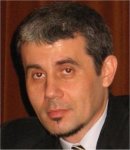|
Plenary
Lecture
Advances on Characteristics Changing and Working State
Degrading of Passive Vibroisolation Elements

Dr. Silviu
Nastac
Research Center for Mechanics of Machines and
Technological Equipments
University "Dunarea de Jos" of Galati
Calea Calarasilor 29, 810017, Braila
Romania
E-mail: snastac@ugal.ro
Abstract: This paper presents some special aspects
regarding changing and degrading phenomenon of
theoretical characteristics for vibroisolation elements
during the exploitation. The approaches are based on the
internal thermodynamic phenomenon developed into the
rubber elements subjected with the various and intensive
dynamic charges. The influences are involved about both
the static and dynamic characteristics, and consist of
rigidity and damping parameters variation.
The main area of this study is framed by the passive
isolation against shocks and vibration, due to the
different technological equipments, of the sensitive
embedded systems. Most of these isolation devices and
systems are based on rubber elements and in some
exploitation cases it was remarked an unusual behavior
or an untimely evolution to a final damaged state.
The analysis is based on the large sets of virtual and
instrumental tests, performed for different types of
vibroisolation elements, with various structural and
functional configurations. All of these was developed
supposing the basic compressing and torsion rubber
elastic elements, their working principle, and their
functional restraints.
Through the comparative analysis of the acquired
results, with the computational dynamics simulation, it
was developed a few theoretical and operational models.
Besides of the thermodynamics phenomenon, that are
happen into the isolator, it was supposed the non-linear
effects of damping and of rigidity that are usual
characteristics of a real elements behavior. The
reduction of transient states and decreasing the
magnitude of permanent oscillations for specific
parameters (like rigidity, damping, natural frequency,
etc) around their reference value was the major and
permanent purposes of this study.
The main concluding remark denotes the differences
between simple theoretical models results and the real
elements evolution under the charges. Because of the
shifting and modification of the static and dynamic
characteristics, the final evolution of the isolator may
acquire unbalanced values for specific parameters. As a
function of concrete and practical application of these
rubber isolators it has to take into consideration the
qualitative and quantitative deviation to the
theoretical characteristics for a proper evolution such
as it was imposed by the initial working conditions.
Brief Biography of the Speaker:
Silviu Nastac (born in 1971) received the PhD degree in
Mechanical Engineering from University "Dunarea de Jos"
of Galati, Romania, in 2006. He obtained a Master
degree's in Computational Mechanics in 1997 and in
Mechanics of Deformable Solids in 2004, at the same
University. Since 1997 he is a senior research scientist
at the Research Center for Mechanics of Machines and
Technological Equipments, at Engineering Faculty in
Braila, University "Dunarea de Jos" of Galati, Romania.
He is a winner of the prize AROTEM of Romanian
Association for Construction Technologies, Equipments
and Mechanization in 2006. His main research topics
include the theory of mechanics, dynamics, vibrations,
acoustics, modelling and simulation of dynamic
phenomenon, and virtual instrumentation. His work has
been published in numerous referee journals,
international conferences and several books. He has led
and was involved in various research projects and has a
plenary lecture at WSEAS Intl. Conf. Recent Advances in
Automation & Information 2009. He was proposed and chair
a structured session at Intl. Vilnius Conference on
Sustainable Development in 2009. He is a member of
International Institute of Acoustics and Vibration,
International Association of Engineers, Romanian Society
of Acoustics, Romanian Society for Theoretical and
Applied Mechanics, and he is managing editor, associate
editor and reviewer for national and international
journals and conferences.
|
